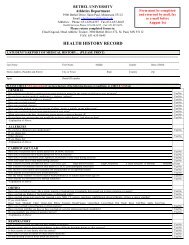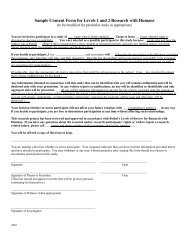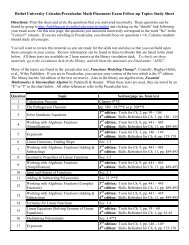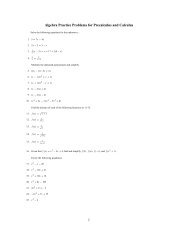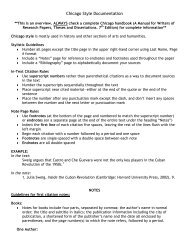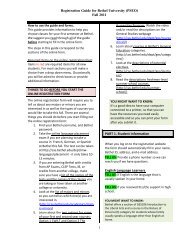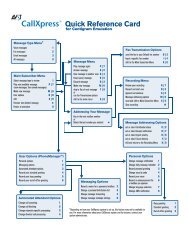here - College of Arts & Sciences - Bethel University
here - College of Arts & Sciences - Bethel University
here - College of Arts & Sciences - Bethel University
Create successful ePaper yourself
Turn your PDF publications into a flip-book with our unique Google optimized e-Paper software.
they factor on a subconscious level. While they don't serve as a basis for decisionmaking,<br />
I do have a few preferences: 1) succinct tags for arguments, 2) some slight<br />
pauses when moving to a new position or sheet <strong>of</strong> paper, 3) clear speaking. I would like<br />
to give your arguments as much consideration as possible and have found that your<br />
argument is more likely to make it onto my flow and into my head if you speak clearly,<br />
pause some, and have succinct tag lines. Also, I don't like it when debaters are rude to<br />
each other.<br />
Relative importance <strong>of</strong> on-case argumentation to the critic in decision-making:<br />
The relative importance <strong>of</strong> on-case argumentation is completely dependent on the round.<br />
Openness to critical/performative styles <strong>of</strong> debating:<br />
I'd like to think I'm open-minded about different approaches to debate. I haven't seen<br />
much performative debate, though, so I'm hesitant to make pronouncements about it. I'm<br />
definitely willing to listen to anything and am happier when t<strong>here</strong> is a justification for<br />
doing what you're doing. I'm fine with critical debate.<br />
Any additional comments:<br />
Moderating my previously reactionary feelings about fairness and ground, I ask only that<br />
debaters measure and weigh claims (and support) about fairness and ground. I find that<br />
many claims about ground and fairness require me to intervene to make decisions<br />
regarding them (I have a hard time determining how much prep time you’ve lost and how<br />
unfair that makes the debate), and I am uncomfortable doing this. Of course, t<strong>here</strong> are<br />
many circumstances w<strong>here</strong> these claims are necessary, and I find myself voting on them<br />
more than I thought I would, but it’s helpful if you can provide ways to evaluate those<br />
arguments fairly. Because I’m more or less a policymaker, arguments about vagueness,<br />
advocacy shift, etc., are more compelling when they also include impacts to decision<br />
making in a policy arena.<br />
I don’t require a point <strong>of</strong> order to discount new arguments, but you should call the point<br />
<strong>of</strong> order if you are worried that I might miss it.<br />
Because I learn so much from listening to and judging debates, I don’t like to be very<br />
prescriptive in my judging philosophy. Debaters frequently change my mind about<br />
arguments, types <strong>of</strong> arguments, and specific issues. I try to be very open-minded about<br />
arguments and debate styles. For the most part, you know what works for you, and I look<br />
forward to hearing it!<br />
58



